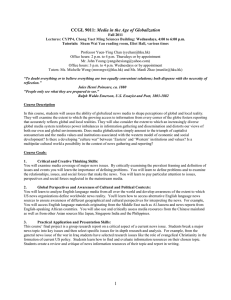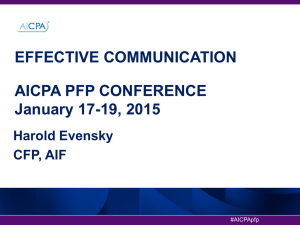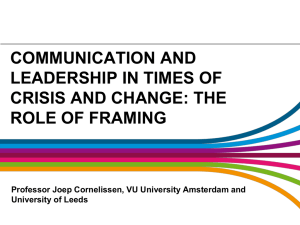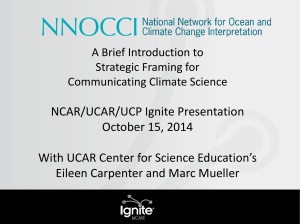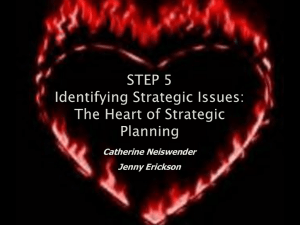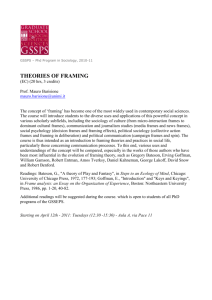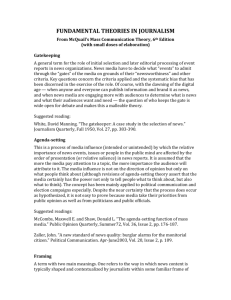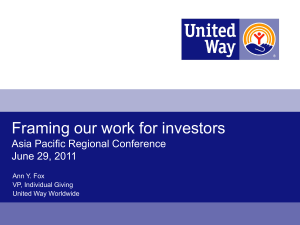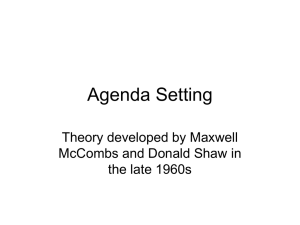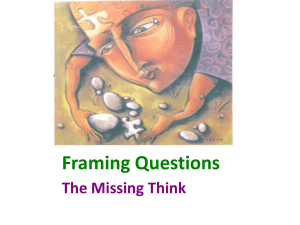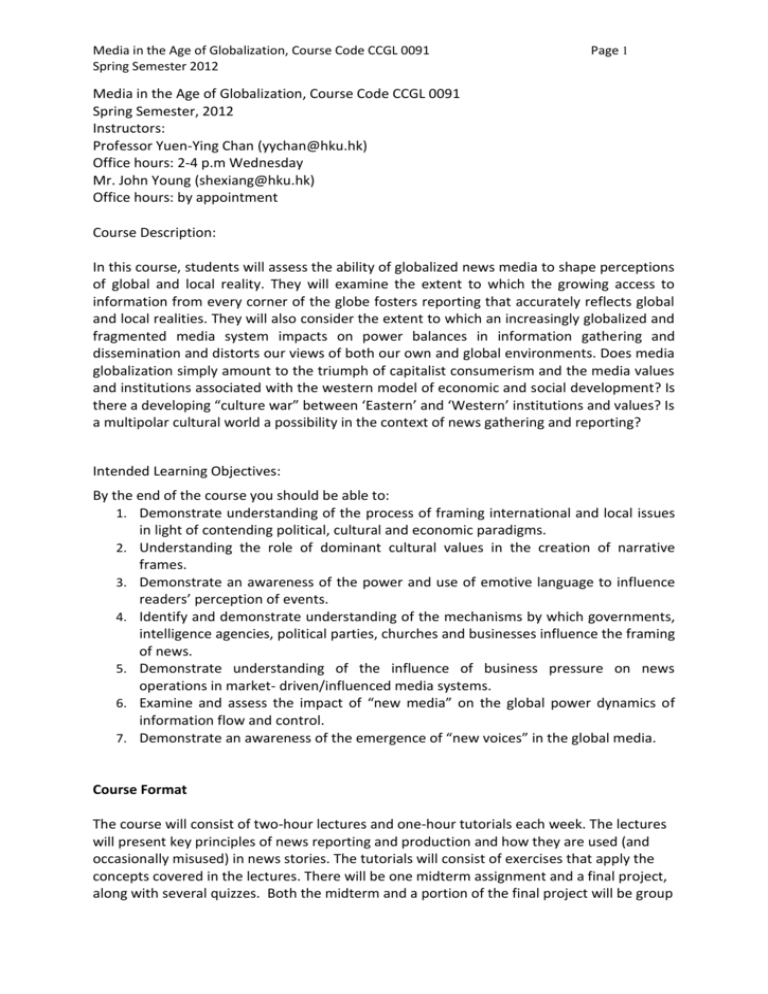
Media in the Age of Globalization, Course Code CCGL 0091
Spring Semester 2012
Page 1
Media in the Age of Globalization, Course Code CCGL 0091
Spring Semester, 2012
Instructors:
Professor Yuen-Ying Chan (yychan@hku.hk)
Office hours: 2-4 p.m Wednesday
Mr. John Young (shexiang@hku.hk)
Office hours: by appointment
Course Description:
In this course, students will assess the ability of globalized news media to shape perceptions
of global and local reality. They will examine the extent to which the growing access to
information from every corner of the globe fosters reporting that accurately reflects global
and local realities. They will also consider the extent to which an increasingly globalized and
fragmented media system impacts on power balances in information gathering and
dissemination and distorts our views of both our own and global environments. Does media
globalization simply amount to the triumph of capitalist consumerism and the media values
and institutions associated with the western model of economic and social development? Is
there a developing “culture war” between ‘Eastern’ and ‘Western’ institutions and values? Is
a multipolar cultural world a possibility in the context of news gathering and reporting?
Intended Learning Objectives:
By the end of the course you should be able to:
1. Demonstrate understanding of the process of framing international and local issues
in light of contending political, cultural and economic paradigms.
2. Understanding the role of dominant cultural values in the creation of narrative
frames.
3. Demonstrate an awareness of the power and use of emotive language to influence
readers’ perception of events.
4. Identify and demonstrate understanding of the mechanisms by which governments,
intelligence agencies, political parties, churches and businesses influence the framing
of news.
5. Demonstrate understanding of the influence of business pressure on news
operations in market- driven/influenced media systems.
6. Examine and assess the impact of “new media” on the global power dynamics of
information flow and control.
7. Demonstrate an awareness of the emergence of “new voices” in the global media.
Course Format
The course will consist of two-hour lectures and one-hour tutorials each week. The lectures
will present key principles of news reporting and production and how they are used (and
occasionally misused) in news stories. The tutorials will consist of exercises that apply the
concepts covered in the lectures. There will be one midterm assignment and a final project,
along with several quizzes. Both the midterm and a portion of the final project will be group
Media in the Age of Globalization, Course Code CCGL 0091
Spring Semester 2012
Page 2
projects. Students unable to work within a group may submit an individually prepared
report in satisfaction of the final project requirement. Topics for final projects will be
announced at mid-semester.
Course Grading: Assessment Tasks & Standards
Assessment
Method
Final research project
Brief Details of Assignment
A written report comparing and analyzing news
coverage of a topic or time period by two different
news organizations.
10 pages plus references
40%
Quizzes and short
writing assignments
Three quizzes or short writing assignments on the
readings, lectures and current events.
15%
Midterm Group project
Group project comparing a day's news in Hong
Kong:
20%
Language analysis
An exercise to analyze the use of emotive
language in news reports
Informal and prepared debates and presentations
conducted during tutorial sessions as well as
preparation for and active participation in tutorial
discussions
10%
Group debates/
presentations/tutorial
discussion &
participation
Course Timetable & Required Readings:
Week 1: Ying Chan and John Young
September 19, 2012
Introduction and Course Overview
The Revolution Will Not Be Televised or The Revolution will be tweeted?
Three Case Studies: Arab Spring, America at War, Iraq and Vietnam
Readings
News as a Process, How Journalism Works in the Age of Twitter,
Erik Bleich, How much free speech do we need?
Week 2: Kevin Sites
September 26, 2012
Global Media and One Man’s Adventure as a Backpack Journalist
Examples of Kevin Sites’ Work as a Backpack Journalist
In Afghanistan: (brief graphic images)
http://www.globalpost.com/dispatch/afghanistan/100810/private-insecurity
Weighting
15%
Media in the Age of Globalization, Course Code CCGL 0091
Spring Semester 2012
Page 3
“A World of Conflict” Documentary (in chapters):
http://www.youtube.com/profile?user=kshz
Articles Concerning the Evolution of Backpack Journalism & The Hot Zone Project:
Backpack Journalism
http://www.technewsworld.com/story/Searching-for-the-Ed-Murrow-of-the-BackpackJournalist-Generation-67250.html?wlc=1245117073
Boston Phoenix Examines Kevin Sites in the Hot Zone Project
http://thephoenix.com/Boston/news/2415-yahoos-one-man-news-army/
CJR Examines Sites Coverage of Israel-Hezbollah Conflict
http://www.cjr.org/behind_the_news/sites_dives_into_israel_and_en.php
Asia Media, Kevin Sites in Katmandu
http://www.asiamedia.ucla.edu/article.asp?parentid=46627
Asia Media Experiments in Conflict Reporting
http://www.asiamedia.ucla.edu/article.asp?parentid=67963
Transcripts of Interviews with Kevin Sites Concerning Evolution of News
Transcript of Kevin Sites on CNN Discussing Backpack Journalism
http://transcripts.cnn.com/TRANSCRIPTS/0602/18/i_c.01.html
Kevin Sites Interviewed by CNN Media Critic Howard Kurtz
http://www.cyberjournalist.net/news/003175.php
Week 3: Ying Chan
October 3, 2012
THE EVOLVING GLOBAL MEDIA SYSTEM
Readings:
Video Presentation from Robert Greenwald's documentary: "Outfoxed: Rupert Murdoch's
War on Journalism" and Amy Goodman's Video Critique: "Independent Media in A Time of
War:"
Readings:
A Propaganda Model, from Manufacturing Consent: The Political Economy of the Mass
Media, Edward S. Herman and Noam Chomsky, Pantheon Press, New York 2002, pp.15-26
Week 4: John Young
October 10, 2012
Language and the Power to Persuade: Pt. 1, Connotative and Denotative Meanings of
Words
Readings:
How the Language Really Works: Inference and Denotation, Inference and Association:
http://www.critical-reading.com/inference_denotation.htm
http://www.critical-reading.com/inference_association.htm
Week 5: John Young
October 17, 2012
Language and the Power to Persuade: Pt. 2, Defending the Indefensible
Readings:
Politics and the English Language, George Orwell, 1946
http://www.netcharles.com/orwell/essays/politics-english-language1.htm
Media in the Age of Globalization, Course Code CCGL 0091
Spring Semester 2012
Page 4
Week 6: John Young
October 24, 2012
FRAMING Part 1
What is News? Framing and Triggers in News Reporting and Writing Part 1
Readings:
Framing the News: Triggers, Frames and Messages in Newspaper Coverage, A Study of the
Project for Excellence in Journalism:
http://www.journalism.org/resources/research/reports/framing/default.asp
Oct 31 reading week
Week 7: John Young
November 7, 2012
Framing Part 2 Political and Cultural Framing of News Events
Readings:
The News About Democracy: An Introduction to Governing the American Political System,
from News, The Politics of Illusion, W. Lance Bennett, 2005, Longman Press, pp. 1 to 30, On
Reserve at the JMSC Office, Ground Floor, Eliot Hall
Midterm Assignment:
Comparing the Selection and Framing of News in Hong Kong Newspapers. To be explained
in class.
Week 8: John Young
November 14, 2012
PUBLIC OPINION & PUBLIC POLLS and EDITORIAL OPINION PIECES
Part One: Making Sense of Polls and Surveys
Evaluating Arguments and Editorial Opinion Pieces:
Begging the Question, Slippery Slopes and Other Weapons of Mass Deception.
We will look at the fundamentals of argument and identify common flaws in argument
including the use of unfounded assumptions, begging the question, slippery slopes, ad
hominem attacks, appeals to authority, ad populum, among others.
Readings:
How Polls Are Conducted: http://www.gallup.com/help/FAQs/poll1.asp
Handout: “Are there Any Fallacies in the Reasoning?” from “Asking the Right Questions, A
Guide to Critical Thinking, M. Neil Browne and Stuart M. Keely
Week 9: Ying Chan
November 21, 2012
CHINA MEDIA SYSTEM AND THE SEARCH FOR SOFT POWER
Required Readings:
Qian and David Bandurski, “China's Emerging Public Sphere” in Changing Media Changing
China, Susan Shirk ed.
Hu Xijin, “An Editor’s View: Western Bias Miss the Reality in Our Reporting,” Global Asia,
V5N2 Summer 2010
Media in the Age of Globalization, Course Code CCGL 0091
Spring Semester 2012
Page 5
Ying Chan, “A Scholar’s View: The State Media Have an Iron Grip and Grand Plans,” Global
Asia, V5N2 Summer 2010
Norah TWIZELL, “CCTV, 1.2 BILLION VIEWERS STRONG”
Optional
Ying Zhu, The Inside story of When China’s State Run TV criticized the party
Week 10: Ying Chan
November 28, 2012
The Internet and an Informed Society
Wikipedia, Blogs and SMS: Privacy, Intellectual Property and Accessing and Assessing
Alternative Information Resources
Readings:
Selections from Rebecca MacKinnon, Consent of the Networked
Evaluating Internet Research Sources
www.virtualsalt.com/evalu8it.htm
A Guide to Critical Thinking About What You See on the Web:
http://www.ithaca.edu/library/Training/hott.html
Week 11: Ying Chan
December 5, 2012
Global Media, Global Voices
Readings:
Selections from Global Voices, http://globalvoicesonline.org
Selections from Dan Gillmor, Mediactive
“Is the Press Any Match for Powerhouse PR?”, Alicia Mundy, Columbia Journalism Review,
September/October 1992
Final Assignment: Final Project will be explained in class. Group and Individual written
reports will be due on December xx.
Recommended Reading
There is no textbook for this course, although required readings will be posted on the class
blog. In addition, all students are required to read the international and local sections of the
South China Morning Post and the top stories feed from Reuters and Bloomberg News every
day during the semester. You will be given a password to the SCMP Web site; links to the
feeds are on the course Web site. Please see the course blog for additional recommended
reading and reference materials.
Altschull, J. H. (1995). Agents of power: The media and public policy (2nd ed.). White Plains,
NY: Longman Pub. USA.
Anya Schiffrin & Eamon Kircher-Allen, (2012) From Cairo to Wall Street: Voices from the
Global Spring, New York: New Press,
Bennett, W. L. (2011) News: The politics of illusion (9th ed) New York: Pearson/Longman.
Browne, M. N., & Keeley, S. M. (2009).Asking the right questions: A guide to critical thinking
(9th ed). Upper Saddle River, N.J.: Pearson Prentice Hall.
Chan, J.M, Lee, C.C, Pan, Z and So, C.Y.K.,(2002) Global Media Spectacle: News War Over
Hong Kong
Media in the Age of Globalization, Course Code CCGL 0091
Spring Semester 2012
Page 6
Herman, E. S., & Chomsky, N. (2002). Manufacturing consent: The political economy of the
mass media . New York: Pantheon Books.
Lippmann, W..(1922). Public opinion. New York: Free Press.
Nazer, H. M. (1999). Power of a third kind: The Western attempt to colonize the global
village . Westport, Conn; London: Praeger.
Postman, N.(2005) Amusing Ourselves to Death: Public Discourse in the Age of Show
Business, Penguin,
Rampton, S., & Stauber, J. C. (2003). Weapons of mass deception: The uses of propaganda
in Bush's war on Iraq. New York: Jeremy P. Tarcher/Penguin.
Orwell, George, selected essays.
Seib, Philip, (2012) Al Jazeera English: Global News in a Changing World (The Palgrave
Macmillan Series in International Political Communication)
UNESCO (1978). Declaration on fundamental principles concerning the contribution of the
mass media to strengthening peace and international understanding, to the promotion of
human rights and to countering racialism, apartheid and incitement to war. (UNESCO
Document 20C/20 21).
Selected journal articles
Ravi, N. (2005). Looking beyond flawed journalism: How national interests, patriotism, and
cultural values shaped the coverage of the Iraq War. Harvard International Journal of
Press/Politics, 10(1), 45-62.
Mundy, A. (September/October 1992). Is the press any match for powerhouse PR? Columbia
Journalism Review, 31, 27-34.
Entman, R. M. (2004). Projections of power: Framing news, public opinion, and U.S. foreign
policy. Chicago; London: University of Chicago Press.
Silverstone, R. (2007). Media and morality: On the rise of the mediapolis. London: Polity
Press.
Recommended Website(s)
A Guide to Critical Thinking About What You See on the Web
http://www.ithaca.edu/library/training/think.html
Evaluating Internet Research Sources
http://www.virtualsalt.com/evalu8it.htm
Framing the News: Triggers, Frames and Messages in Newspaper Coverage, A Study of the
Project for Excellence in Journalism
http://www.journalism.org/node/445
Gallup: How Polls are Conducted
http://www.gallup.com/poll/File/125927/How%20Are%20Polls%20Conducted%20FI
NAL.pdf
How the Language Really Works: Inference and Denotation, Inference and Association
http://www.criticalreading.com/inference_denotation.htm
http://www.criticalreading.com/inference_association.htm
Politics and the English Language, George Orwell, 1946
http://www.netcharles.com/orwell/essays/politics-english-language1.htm
Free Speech Debate, Oxford University
http://freespeechdebate.com/en/
Media in the Age of Globalization, Course Code CCGL 0091
Spring Semester 2012
1.
Page 7
Course Grade Descriptors
A
1. Demonstrate
Sophisticated
an
understandin
understanding of g of the
the process of
framing
framing
process and
international and its
local issues in
surrounding
light of
politics
contending
political, cultural
and economic
paradigms.
2. Apply an
Sophisticated
understanding of understandin
the importance
g of the
of dominant
importance
cultural values to of dominant
the creation of
cultural
narrative frames. values to the
creation of
narrative
frames
B
Clear
understanding
of the framing
process and its
surrounding
politics
C
Understanding
of the framing
process and its
surrounding
politics
D
Bare
minimum
understandi
ng of the
framing
process and
its
surrounding
politics
F
Little or no
understandin
g of the
framing
process and
its
surrounding
politics
Clear
understanding
of the
importance of
dominant
cultural values
to the creation
of narrative
frames
Understanding
of the
importance of
dominant
cultural values
to the creation
of narrative
frames
Bare
minimum
understandi
ng of the
importance
of
dominant
cultural
values to
the creation
of narrative
frames
Some
Bare
awareness of
minimum
the power and awareness
use of emotive of the
language to
power and
influence
use of
readers’
emotive
perception of
language to
events
influence
readers’
perception
of events
Understanding Bare
of the
minimum
mechanisms
understandi
by which
ng of the
different
mechanisms
institutions
by which
influence the
different
Little or no
understandin
g of the
importance
of dominant
cultural
values to the
creation of
narrative
frames
3. Demonstrate
an awareness of
the power and
use of emotive
language to
influence
readers’
perception of
events.
High
awareness of
the power
and use of
emotive
language to
influence
readers’
perception of
events
Moderate
awareness of
the power and
use of emotive
language to
influence
readers’
perception of
events
4. Identify and
demonstrate
understanding of
the mechanisms
by which
governments,
intelligence
Sophisticated
understandin
g of the
mechanisms
by which
different
institutions
Clear
understanding
of the
mechanisms by
which different
institutions
influence the
Little or no
awareness of
the power
and use of
emotive
language to
influence
readers’
perception of
events
Little or no
understandin
g of the
mechanisms
by which
different
institutions
Media in the Age of Globalization, Course Code CCGL 0091
Spring Semester 2012
Page 8
agencies,
political parties,
churches and
businesses
influence the
framing of news.
5. Demonstrate
understanding of
the influence of
business
pressure on
news operations
in marketdriven/influence
d media systems.
influence the
framing of
news
framing of news framing of
news
Sophisticated
understandin
g of the
influence of
business
pressure on
news
operations in
marketdriven/influe
nced media
systems
Clear
understanding
of the influence
of business
pressure on
news
operations in
marketdriven/influenc
ed media
systems
6. Examine and
assess the
impact of “new
media” on the
global power
dynamics of
information flow
and control.
Thorough
and in-depth
examination
and
assessment
of the impact
of “new
media” on
the global
power
dynamics of
information
flow and
control
Thorough
examination
and assessment
of the impact of
“new media”
on the global
power
dynamics of
information
flow and
control
7. Demonstrate
an awareness of
the emergence
of
“new/alternative
voices” in the
global media.
High
awareness of
the
emergence
of
“new/alterna
tive voices”
in the global
media
Moderate
awareness of
the emergence
of
“new/alternativ
e voices” in the
global media
Understanding
of the
influence of
business
pressure on
news
operations in
marketdriven/influen
ced media
systems
institutions
influence
the framing
of news
Bare
minimum
understandi
ng of the
influence of
business
pressure on
news
operations
in marketdriven/influ
enced
media
systems
Basic
Bare
examination
minimum
and
examination
assessment of and
the impact of
assessment
“new media”
of the
on the global
impact of
power
“new
dynamics of
media” on
information
the global
flow and
power
control
dynamics of
information
flow and
control
Some
Bare
awareness of
minimum
the
awareness
emergence of of the
“new/alternati emergence
ve voices” in
of
the global
“new/altern
media
ative
voices” in
the global
media
influence the
framing of
news
Little or no
understandin
g of the
influence of
business
pressure on
news
operations in
marketdriven/influe
nced media
systems
Partial or no
examination
and
assessment
of the impact
of “new
media” on
the global
power
dynamics of
information
flow and
control
Little or no
awareness of
the
emergence
of
“new/alterna
tive voices”
in the global
media
Media in the Age of Globalization, Course Code CCGL 0091
Spring Semester 2012
Page 9
Assessment Rubric
Each of your assignments will be assessed on at least one of the following criteria. All criteria
are equally weighted, so the final score for assignments with multiple criteria will be based
on an average of the scores for each relevant criterion.
1. Demonstrate an
understanding of the
process of framing
international and local
issues in light of
contending political,
cultural and economic
paradigms.
2. Apply an
understanding of the
importance of dominant
cultural values to the
creation of narrative
frames.
3. Demonstrate an
awareness of the power
and use of emotive
language to influence
readers’ perception of
events.
4. Identify and
demonstrate
understanding of the
mechanisms by which
governments, intelligence
agencies, political parties,
churches and businesses
influence the framing of
news.
5. Demonstrate
understanding of the
influence of business
pressure on news
operations in marketdriven/influenced media
systems.
6. Examine and assess the
impact of “new media”
A+
A
A- B+
B
B-
C+
C
C-
D+
D
F
100
9
5
9
0
89
8
5
8
0
79
7
5
7
0
69
65
<65
100
9
5
9
0
89
8
5
8
0
79
7
5
7
0
69
65
<65
100
9
5
9
0
89
8
5
8
0
79
7
5
7
0
69
65
<65
100
9
5
9
0
89
8
5
8
0
79
7
5
7
0
69
65
<65
100
9
5
9
0
89
8
5
8
0
79
7
5
7
0
69
65
<65
100
9
5
9
0
89
8
5
8
0
79
7
5
7
0
69
65
<65
Media in the Age of Globalization, Course Code CCGL 0091
Spring Semester 2012
on the global power
dynamics of information
flow and control.
7. Demonstrate an
awareness of the
emergence of
“new/alternative voices”
in the global media.
100
9
5
9
0
89
8
5
Page 10
8
0
79
7
5
7
0
69
65
<65

